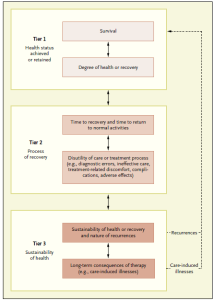When Professor Michael Porter did some “deep thinking” about where value is actually delivered in healthcare, he created a simple table that displays three tiers. I found his second value tier EXCITING: a Harvard Business School professor was validating my own “gut feel” about what really counts. I summarize Porter’s three tiers this way (you can see his own table below this post):
Tier 1: Delivering a desired health status — Avoiding death; optimizing health or extent of recovery.
Tier 2: Minimizing the time it takes to restore the normal rhythm of everyday life — the cycle time required to produce a return to full participation in life (or best attainable level).
Tier 3: Sustaining health or recovery, minimizing recurrences and iatrogenic (care-induced) illnesses and consequences.
Porter’s free article appeared in the December 23, 2010 issue of the New England Journal of Medicine. In his comments on Tier 2, Porter said: “Cycle time is a critical outcome for patients — not a secondary process measure, as some believe.” I have focused most of my professional energy for the last couple of decades on shortening cycle time — because it clearly produces better overall life outcomes. I hoped Porter’s article would catalyze a lot of discussion and much more attention to Tier 2 — but not much luck so far.
Personally, I believe that the purpose of being alive is to live a fully human life. From that perspective, the most VALUABLE healthcare services are those that minimize the impact of illness or injury on the rhythm of everyday life. I want all healthcare professionals to START here: Our FUNDAMENTAL purpose is to avert premature death, relieve fear and suffering, and to enhance, preserve,or restore as quickly as possible every patient’s ability to participate in the specific activities that make life worth living — which for many includes productive engagement / work.
We are a social species. We have an innate drive to be useful in some way, to have a role to fulfill. We are happier when we have a clear purpose in life. Those of us in the middle years of the human lifespan are DESIGNED to work — to hold up our end and contribute to the well-being of our family, clan, community or nation. The well-being of our country, and even more broadly, the survival of our species depends on maintaining the right balance between dependents and contributors.
The AFL-CIO’s website says this about work: “Work is what we do to better ourselves, to build dreams and to support our families. But work is more than that. Work cures, creates, builds, innovates and shapes the future. Work connects us all.” As the Episcopal Book of Common Prayer‘s Order for Compline (an evening prayer service) poetically puts it: “Grant that we may never forget that our common life depends upon each other’s toil.”
